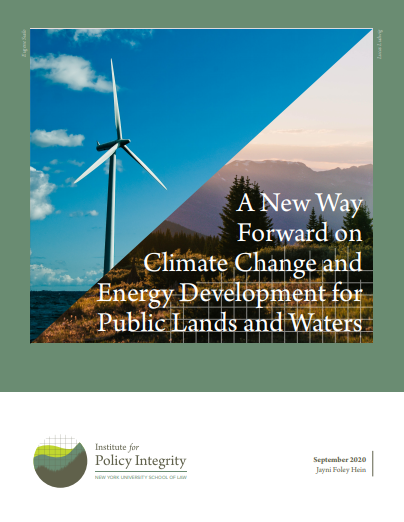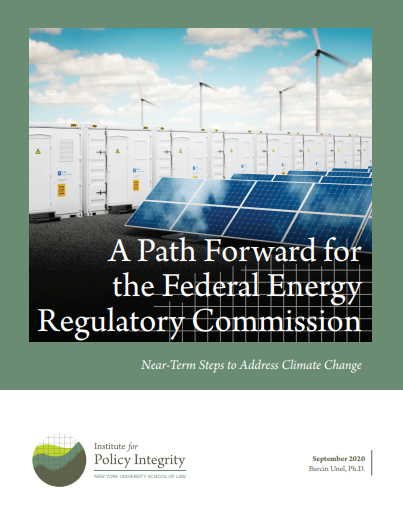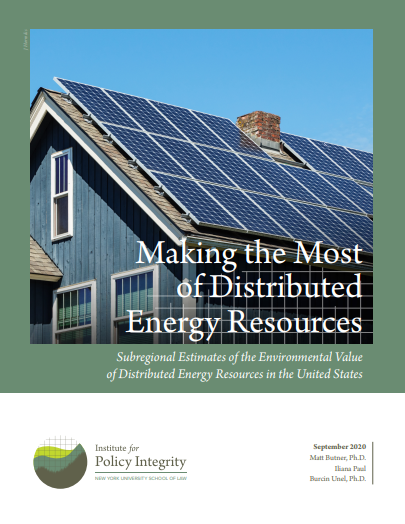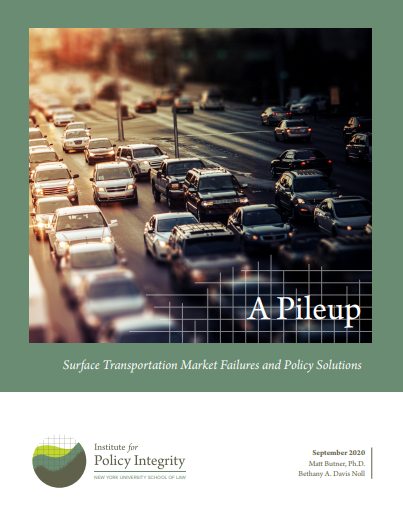-
A New Way Forward on Climate Change and Energy Development for Public Lands and Waters
The Department of the Interior has yet to develop a comprehensive plan to accurately account for, manage, and mitigate the greenhouse gas emissions that result from the extraction and combustion of fossil fuels from public lands and waters. This document describes immediate and longer-term actions that Interior’s Bureau of Land Management and Bureau of Ocean Energy Management should take to reform public lands management consistent with climate change, conservation, and fiscal reform priorities.
-
Comments to EPA on Airplane Emissions Regulations
The Environmental Protection Agency (EPA) proposed airplane pollution standards that have no effect on emissions and require no technological improvements. EPA does analyze one scenario in the technical support for the proposal, however, that appears to have modest greenhouse gas emissions reduction effects. But the agency improperly monetizes and weighs those reductions. We submitted joint comments that detail flaws in EPA’s analysis and describe how the agency can correctly apply the social cost of carbon.
-
Comments to Arizona on Integrated Resource Planning
The Arizona Corporation Commission regularly requires that load serving entities (LSEs), which supply electricity to ratepayers, file plans with a 15-year time horizon disclosing environmental impacts from different resource mixes and how they will address those impacts. We submitted comments encouraging the Commission to ask that LSEs provide monetized estimates of the damages they expect to result from greenhouse gas emissions using the social cost of carbon.
-
A Path Forward for the Federal Energy Regulatory Commission
Near-Term Steps to Address Climate Change
The Federal Energy Regulatory Commission should take an active role in better aligning regulatory practices with climate policies, speeding up development of necessary transmission infrastructure, and reforming energy market rules. This report details the specific policy reforms that federal policymakers should pursue to take advantage of important opportunities energy markets can provide to combat climate change while ensuring an economically efficient and speedy clean energy transition.
-
Making the Most of Distributed Energy Resources
Subregional Estimates of the Environmental Value of Distributed Energy Resources in the United States
This report provides a new set of hourly E-Values for the whole United States, broken down into 19 subregions, using an open-source reduced-order dispatch model. The patterns uncovered by these estimates can help policymakers design economically efficient DER policies to reduce air pollution from electricity generators.
-
A Pileup
Surface Transportation Market Failures and Policy Solutions
Surface transportation market failures, including greenhouse gas emissions, local air pollution, traffic congestion, and traffic collisions, generate billions of dollars in economic harm every year. Guided by economic principles, this report outlines several options for reforming U.S. surface transportation that account for technological, institutional, and political realities. It also highlights the unequal burden of market failures in the transportation sector and discusses policy solutions that can help lead to more just outcomes.
-
Comments to DOE on Energy Conservation Analysis for Air Conditioners
The Department of Energy (DOE) requested input on the analytical framework, models, and tools that it is using to evaluate potential standards for room air conditioners. In the technical support document, DOE departs from recent practice by proposing to focus on the domestic-only “interim” social cost of greenhouse gases estimates. We submitted joint comments recommending that DOE should, as it has in the past, continue to monetize the full climate benefits of greenhouse gas emissions reductions, using the best available estimates, which were derived by the Interagency Working Group on the Social Cost of Greenhouse Gases.
-
Comments to FERC on PennEast Amendment Project
The PennEast 2020 Amendment Project, which provides for various additions to the proposed PennEast pipeline, would result in significant greenhouse gas emissions. We submitted comments on the Federal Energy Regulatory Commissions’s draft environmental assessment of the project, which fails to meaningfully assess the impact of emissions using social cost of carbon metrics.
-
Comments to the New York PSC on Resource Adequacy
The Brattle Group developed a resource adequacy scenario analysis for the New York Public Service Commission (PSC), which is considering how to best meet its electricity generating capacity and resource adequacy needs. We submitted comments encouraging the PSC to consider several questions that Brattle’s analysis does not examine in depth.
-
Amicus Brief in D.C. Circuit on Landfill Methane Delay Rule
The Environmental Protection Agency (EPA) finalized a rule delaying compliance deadlines for methane emissions controls at solid waste landfills. We filed a brief in the U.S. Court of Appeals for the D.C. Circuit focusing on EPA's failure to adequately assess the forgone benefits of the delay.
Viewing recent projects in Climate and Energy Policy












